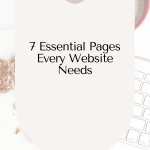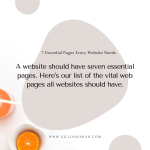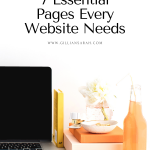
7 Essential Pages Every Website Needs
Table of Contents
ToggleSharing is caring!
Reading Time: 3 minutes


A website should have seven essential pages. Miss one, and you might end up jeopardizing your business. Here’s our list of the vital web pages all websites should have.
Building a website for your business? Finally! Bet you can’t wait to grow your business on the global stage!
But wait, what web pages should you put into your business website? Creating a website for the first time can be tricky because there are just so many little details to think about, the layout, the images, the text, the SEO; the list goes on!
A successful website should have all the essential pages to present information in the best way possible. So what are these web pages?
The Home Page
This is the first page that viewers see when they search for your website. As the most traffic-heavy web pages on your website, the homepage should look good; it should be informative and engaging. Start piecing together a compelling homepage with a hero image (the main image that tells your brand story) and a tagline. Your tag line should describe who you are, what you do, and who you do it for.
The homepage should also introduce your featured services, a short bio, some testimonials, and perhaps, an image slide of your main products. The footer or the bottom of your homepage should outline your business’ contact details, business hours, and social media profiles for people to follow.
About Us Page
In terms of traffic generation, the About Us page is second only to the Homepage. People go here to learn more about your business, so present all the information in an engaging manner.
You can start by giving a short history of your company, your business ethos, and whatever achievements or accreditations that your company has received. Highlight your company's mission and values and add some fun facts about your business. You can also feature your team if you have one to make your business more relatable to customers.
Be sure that the message is aligned with your potential client’s pain points – needs, problems, and/or fears, to make a strong connection.
Product or Service Page
This is the meat of your website, the content that attracts potential clients in the first place.
Your product and services page should lay out all the goods and services you offer. For product-based businesses, it should feature product descriptions, product images, and the offer. For service-based businesses, it should outline the services, pricing plans, and offer.
You want to consolidate all the product or service information into one page so that customers don't have to dig too deeply into your website to find what they are looking for. A succinct description, a clear call to action, and a “buy now” are a must to nudge potential customers into completing a purchase.
Contact Page
Sure, you can leave your contact details at the bottom of your website, but you need a dedicated webpage for your contact details. It just makes things more organized for you and your potential customers.
Generally, the contact page outlines the business email, phone number, address, and business hours. You can make the contact page even more helpful and versatile by adding a short FAQs section, a refund policy, or pricing details.
If you're a service-based business, you can also add collaboration terms for affiliate infos, or a section for booking a service. Then, add a field that people could fill in for inquiries in case they have more questions.
Privacy Policy
This is perhaps one of the most important pages on a website because, by law, you’re required to have one. The Privacy Policy outlines how your website collects, stores, and uses user information. The federal law requires all websites to have their own Privacy Policy.
Apart from letting site visitors know how your website collect, store, process, and share user information, your Privacy Policy should outline your website's own guidelines, what features to use, what laws governs certain agreements. We also suggest adding intellectual property disclosure or copyright laws, including a clause explaining that you’re not responsible for any links to third parties.
FAQs
Offering the best customer service includes providing answers to frequently asked questions. Save your viewers’ time by outlining all the common questions about your business and delivering the answers on one dedicated website page.
Your FAQs page should include:
- Q and A about the services you offer
- Q and A related to common misconceptions about your business
- Q and A related to your pricing plans
- Q and A related to the purchase process
- Shipping policies
- Return policies
Blog Site
A blog site plays a critical role in boosting a website’s online searchability. Think of a blog site as a springboard for your marketing and SEO efforts. With a blog site, you can provide vital information about your services and business in general, connect with your viewers on a more personal level, and provide solutions to their problems. It’s a great place to reach out to readers, build a community, and develop a credible brand. It is a must for all business websites!
The kind of web pages to add to your website depends on the type of business you have. But these seven website pages are pretty universal, they're vital if you're running a service or product-based business.
Most Popular Posts:
Sharing is caring!
PLEASE COMMENT BELOW